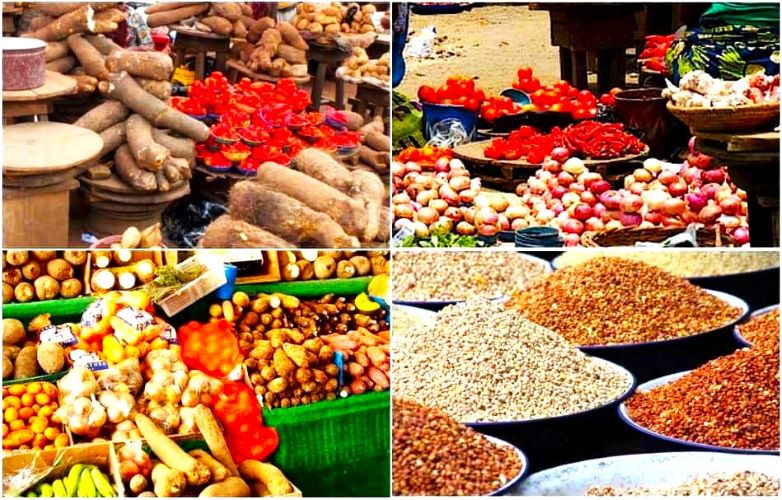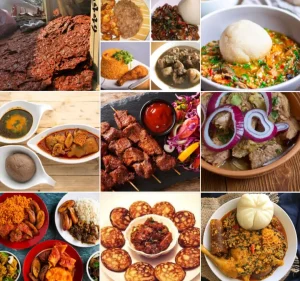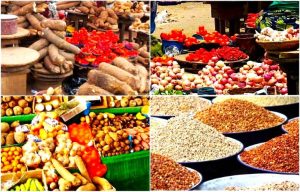Exploring Nigeria’s Rich Heritage Through Traditional Foods: Iconic Dishes You Need to Try
Nigeria is a country known for its vibrant culture and diversity, which is beautifully reflected in its traditional foods. Each dish not only offers a unique flavor profile but also embodies the history, customs, and values of the regions and ethnic groups it represents.
This exploration of Nigeria’s rich culinary heritage delves into iconic dishes like egusi, suya, akara, and jollof rice, as well as lesser-known specialties, examining their origins, cultural significance, and the unique ways they continue to impact both Nigerian and global food culture.
The Cultural and Regional Roots of Nigerian Dishes
Nigeria’s traditional foods are deeply connected to its various ethnic groups, with each region contributing its own unique flavors, ingredients, and cooking styles:
- Egusi Soup
A staple in the diets of many ethnic groups, particularly among the Yoruba and Igbo, egusi soup is made from ground melon seeds cooked with leafy vegetables, palm oil, and often various meats or fish. Known for its rich, nutty flavor and creamy texture, egusi is often enjoyed with pounded yam or fufu, forming a complete meal that reflects the communal spirit of Nigerian gatherings. This dish plays a major role in celebrations and communal feasts, making it a symbol of Nigerian hospitality and unity. - Suya
Suya is a beloved street food originally from northern Nigeria, associated with the Hausa people. This dish consists of spiced, skewered meat (often beef or chicken) grilled to smoky perfection and served with slices of onions, tomatoes, and extra spices for dipping. The complex spice blend, known as “yaji,” includes ingredients like ground peanuts, ginger, and chili, giving suya its distinctive flavor. Suya’s popularity has spread across Nigeria, making it a go-to snack that represents both cultural pride and the joy of casual, shared meals. - Akara
Known as “bean cakes,” akara is a popular breakfast food and street snack made from mashed black-eyed peas, onions, and spices, deep-fried into crispy, golden fritters. With origins rooted in Yoruba culture, akara is also enjoyed across West Africa. It holds a special place in Nigeria, especially during festivals and family gatherings, symbolizing celebration and community. Additionally, akara is a traditional offering at memorial services, highlighting its role beyond sustenance in spiritual and social practices. - Jollof Rice
While jollof rice is found throughout West Africa, the Nigerian version is renowned for its bold, spicy flavor and vibrant orange-red color from its tomato base. This dish is a centerpiece of Nigerian celebrations and gatherings, often associated with weddings, parties, and festive events. The “Jollof Wars” with Ghana only add to its popularity, and internationally, Nigerian jollof has come to symbolize the country’s rich culinary identity.
Nigerian Foods and Their Role in Celebrations and Ceremonies
Many traditional Nigerian dishes are closely tied to special occasions, festivals, and ceremonies. Understanding these connections helps capture the depth of Nigeria’s food culture:
- Egusi Soup and Pounded Yam: Often reserved for weddings, birthdays, and important family gatherings, egusi soup with pounded yam represents comfort and tradition. It’s a dish that symbolizes abundance, meant to be shared among loved ones as a sign of goodwill and celebration.
- Suya as a Social Food: As a staple at street-side gatherings and night markets, suya embodies the casual, social aspect of Nigerian culture. The experience of eating suya is just as important as the food itself, bringing people together in bustling spaces to share stories, laughter, and good food.
- Festive Akara: Akara is commonly prepared on Fridays or at religious gatherings. Its significance extends to community events, where it’s distributed as an act of sharing and goodwill.
Ingredients and Preparation Techniques: What Makes Nigerian Cuisine Unique
Nigeria’s traditional dishes often rely on local ingredients like yam, cassava, beans, and an array of indigenous spices. These ingredients lend distinct textures and flavors that reflect Nigeria’s agricultural heritage:
- Palm Oil: A cornerstone of many Nigerian dishes, palm oil adds both color and depth of flavor, particularly in soups like egusi and stews.
- Spice Blends: Nigerian cuisine utilizes complex spice blends that vary by region and dish. Yaji (the spice mix used in suya) is just one example of how spices are used not just for flavor but to signify the origins of a dish.
- Slow Cooking Techniques: Traditional dishes like banga soup and oha soup are often prepared through slow cooking, allowing flavors to deepen and marry. This method highlights the emphasis on depth and balance in Nigerian cuisine.
Nigerian Food on the Global Stage: A Growing Influence
As Nigerian communities expand globally, the popularity of dishes like jollof rice, suya, and akara is increasing, with Nigerian restaurants opening in major cities worldwide. This exposure is creating a new wave of fusion recipes and adaptations that maintain traditional flavors while embracing international techniques and ingredients. Nigerian chefs are also gaining recognition, and Nigerian cuisine has become a staple in African food festivals across Europe and the Americas, sparking curiosity and admiration among international food enthusiasts.
Conclusion: Embracing Nigeria’s Heritage Through Food
Nigeria’s traditional foods serve as a tangible link to its rich history and diverse cultures. From the hearty egusi soup to the smoky, spicy suya, these dishes invite people to experience the spirit of Nigerian culture in each bite. For anyone looking to explore Nigerian cuisine, these foods offer a delicious gateway into understanding Nigeria’s community values, festive spirit, and love of bold flavors.
Embracing Nigerian food is more than just eating; it’s participating in a centuries-old tradition that celebrates identity, heritage, and the bonds of community. Whether enjoyed on the streets of Lagos or at Nigerian restaurants around the world, traditional Nigerian foods are a testament to the country’s vibrant cultural legacy.














Post Comment